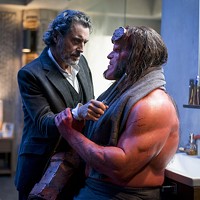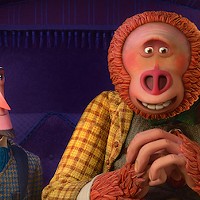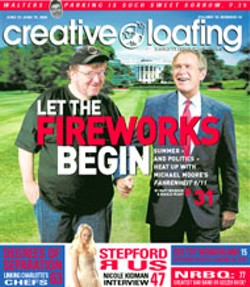Boiling Point
Fahrenheit 9/11 will raise temperatures on both left and right
By Matt Brunson @moviematt1But Fahrenheit 9/11? Heck, there's no guarantee that members from one of its key demographic groups will even show up at the movie theater.
That group, of course, is the "undecideds," those millions of Americans who, we're told, will decide the winner of the upcoming presidential election. Let's be honest here: For better or worse, Fahrenheit 9/11 will be viewed as a propaganda tool first and a motion picture second, and those with strongly held political views won't be swayed one way or the other by Michael Moore's cinematic diatribe against the Bush family. Therefore, when the movie opens this Friday on hundreds of screens across the country (the largest launch ever for a documentary), expect the leftists to pack the theaters while the right-wingers stay home and watch TV. But what of the political wafflers, the folks who can't decide whether to vote for George W. Bush or John Kerry even though the differences between the candidates are like black and white, night and day, and The Cat In the Hat and Citizen Kane? Will the hype draw them into the theater -- as Moore expects -- or will they simply shrug and head for the mall instead, figuring that an informed decision can made in the voting booth on Election Day?
Impossible to predict. At any rate, there can't be a sentient being in this country who isn't at least aware of the movie's existence. Even though it hasn't been released yet, the film, which Moore hastily assembled after winning the Best Documentary Feature Oscar for 2002's Bowling for Columbine, has constantly been in the news for one reason or another: the approximately 15-minute standing ovation it received at the Cannes Film Festival (a new fest record); its nabbing of the event's top prize, the Palme d'Or; Disney's refusal to let its art-house subsidiary Miramax Films release the film (due to either political pressure from the Bush family or Disney head Michael Eisner's desire to remain neutral, depending on who tells the story); the selling of the movie back to Miramax heads Harvey and Bob Weinstein, who created a new company (Fellowship Adventure Group) to shelter the picture while also working out distribution deals with Lions Gate Films and IFC Films; and the current attempt to talk the MPAA into changing its R rating into a more inclusive PG-13.
That's an impressive amount of media exposure for a movie that doesn't feature a boy wizard or a green ogre, but it doesn't answer the central question: Is Fahrenheit 9/11 worth seeing? The answer is, Certainly. And not even so much because of its politics, but because of its compassion.
Clearly, Fahrenheit 9/11 is far more scattershot than Moore's classic debut Roger & Me, which did a better job of compiling all its material into a cohesive narrative. And neither does the film match Bowling for Columbine, which, contrary to detractors' claims, wasn't an anti-gun tirade but rather a mature analysis of what drives America to constantly soak itself in deep reservoirs of violent, antisocial behavior. But as agitprop, this film has few equals, and as a humanist drama, it conveys the convictions of its creator, a man who clearly loves his country and hates to see it destroyed from within.
Starting with the 2000 presidential election -- during those moments when the networks had placed Florida in Al Gore's column and it looked as if the former Vice President was on the verge of a promotion -- Fahrenheit 9/11 then proceeds to document the dismantling of a government. Initially, Moore's main topic of conversation is the Bush clan's ties to not only the bin Laden family but to influential Saudis who, according to one source's estimates, have contributed well over a billion dollars to Bush interests. But Moore also makes sure to touch upon other scandals that have plagued this administration since Day One: Halliburton, Bush's own military record, the abuse of Iraqi prisoners, and the game of "Where's Waldo and his WMDs?" all merit screen time in Moore's critical compilation.
Yet Moore isn't about to let Democrats off the hook, either. He takes them to task for enthusiastically supporting Bush's war as well as endorsing the Patriot Act (according to Michigan Representative John Conyers, most bills pass without even being read by those voting on them). And in one memorable interlude, he approaches various members of Congress in an effort to recruit their kids to fight in Iraq. John Tanner, the Democratic Congressman from Tennessee, greets Moore like an old friend, doubtless figuring the political provoker was in town to cause trouble for the GOP; instead, Moore's attempt to sign up Tanner's kids leaves the politico stammering and stuttering (most other Congressmen are more savvy, not even acknowledging Moore as he approaches).
The stunt is amusing, but as is often the case with Moore, the movie works best when he removes himself from the equation and lets his subjects hang themselves through existing news footage. Here, for instance, is Bush addressing his wealthy admirers at a lavish banquet: "This is an impressive crowd: the haves, and the have-mores. Some people call you the elite; I call you my base." Here, too, is the familiar clip where our pseudo-elected leader states that the US would operate more smoothly under his "dictatorship." And then there's the astounding footage shot the morning of September 11, when Bush was at a Florida elementary school reading My Pet Goat to a classroom of small children. Even after being informed that America was under attack on its own soil, the ersatz Prez simply sits there for a full seven minutes -- with no one to tell him what to do, he's like a deer caught in headlights, paralyzed by the moment and unable to address the situation like a true leader.
Still, for all its political pelting, Fahrenheit 9/11 is at its most gripping when it simply focuses on the innocent people whose lives have been destroyed either by the heinous terrorists or by the abhorrent policies of this administration. Moore is respectful enough not to replay the clips of the planes crashing into the towers, but the footage he does display, of the disbelieving New Yorkers gathered on the streets below, forces our feelings of anguish and anger to rise again, like so much bile in the throat. Equally jarring is the footage from the frontlines in Iraq, shots of decimated homes, burnt babies and more corpses than any sane person could stomach.
And finally, there's the story of Lila Lipscomb, like Moore a resident of Flint, Michigan. Describing herself as a "conservative Democrat" from a family packed with military men, Lipscomb professes that she once held war protesters in contempt, all the more so once her son joined the military and was shipped off to Iraq. But now that her child has been killed over there, she's angry at the waste of a precious life and furious that her son was taken from her merely in service of Bush's personal agenda. Lipscomb's palpable pain over losing her boy is excruciating to watch, as is a moment when she's confronted by a Bush backer unmoved by the fact that her son is now dead (is "compassionate conservative" the ultimate oxymoron or what?).
Errol Morris' 1988 The Thin Blue Line, about a man serving a life sentence for a murder he didn't commit, is rightly considered a landmark documentary, largely because its mere existence was responsible for springing its subject from prison -- in short, it was a movie that saved a life. Fahrenheit 9/11 has the potential to make a similar mark in history: If viewed by the right people, those inquisitive "undecideds," it has the potential to save hundreds, perhaps thousands, of lives -- and instigate an American version of regime change.
Latest in Cover
More by Matt Brunson
-

Fanning flames of expectation
Apr 26, 2019 -

That burning sensation
Apr 19, 2019 -

Gentle giant
Apr 19, 2019 - More »
Calendar
-

Queen Charlotte Fair @ Route 29 Pavilion
-

NEW WINDOW GALLERY-Pat Rhea-ACRYLIC PAINTINGS-April 05-30 2024 VALDESE, NC 28690 @ New Window Gallery/Play It Again Records
- Through April 30, 12 p.m.
-

TheDiscountCodes
-

"Blood Residue Analysis of Paleoamerican Stone Tools in the Carolinas" @ Native American Studies Center
- Fri., April 26, 12-1 p.m.
-

Brightfire Music and Arts Festival @ GreenLife Family Farms










